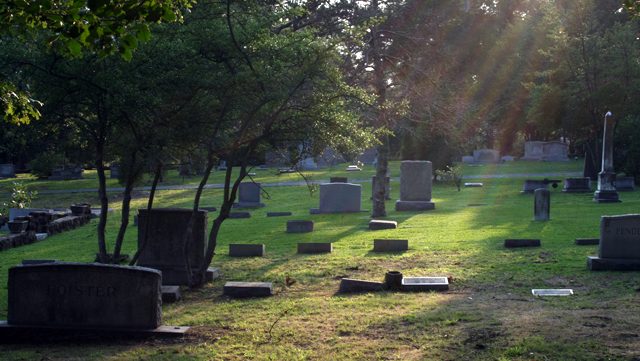Dying with dignity is an elusive goal, made more so by our inability to put our laws in order.

Death happens to us all – but how will we get there? PHOTO Australasian Cemeteries and Crematoria Association
We’re all going to die – you, me, everyone. For a few of us it will be quick and unexpected, but for most it will be a long, often uncomfortable process.
When in good health we don’t think about this much, which is as it should be because life is for living. Talking about it we resort to euphemisms like “passing”, as if the D-word will bring on an epidemic.
My first brush with death, a long time ago, was much like that. My mother told me and my twin sister that Grandad (her father) had “gone to sleep” and would not wake up because he had gone to heaven. A lot for six-year-olds to take in. We didn’t attend the funeral.
Heaven wasn’t in the picture when my own parents aged and died. Their focus was physical and practical: how to survive day-to-day with minimal discomfort. I’ve observed that in others in advanced years, for whom there can be no peace of mind without physical comfort.
I saw it also in Fade to Black, a fine documentary about the last months of Peter Short, who before he died from oesophageal cancer in December 2014 had been national CEO of Coles Express. Director Jeremy Ervine attended the film’s Tasmanian premiere in Hobart last week.
This is a confronting and deeply-personal look at something as old as humanity: voluntary assisted dying, or voluntary euthanasia. It was a fringe issue in my youth, but since the 1990s it has moved steadily closer to the centre of public debate, driven by baby-boomers like Peter Short.
There are a lot of us boomers, born during the 20-odd years when the world was pulling out of economic depression and war. We’ve spent most of our lives getting on with living. But as we get ever-nearer to the end, we can’t help but think about how it might happen.
Like most people I haven’t taken easily to the idea of assisted dying. I’m part of a community, and communities suffer loss with every death. Our first instinct is always to keep people alive.
But sometimes this instinct doesn’t work. For instance, few among us would think a person on life-support, with no chance of recovery and obviously suffering severe pain, should be kept alive.
Fade to Black revolves around Peter Short’s engaging, no-nonsense, often funny discussion of his difficult end-of-life journey and his wish to die with dignity. The story involved his wife Elizabeth (who was at the film screening) and his son Mitch, and drew on the expert advice of Melbourne physician Rodney Syme. But Short makes clear in the movie that the choice as to how he would die was entirely his own.
At a Senate inquiry in the year of his death, Short pointed out that we have rules for using roads and alcohol. “Is it rational to take a position of denying the terminally ill and suffering the choice at the end of their life, because we are concerned we cannot put effective rules around a dying process?”
The answer is no, it’s not rational. Voluntary assisted dying is not about creating new ways to kill, but finding a way to regularise and codify actions that physicians and their patients are already taking to end lives which chronic pain and discomfort have rendered unbearable.
In jurisdictions around the world this subject has given rise to passionate, sometimes anguished, debate. The most recent Australian experience was in Tasmania in May, when a bill put up by Labor’s Lara Giddings and the Greens’ Cassy O’Connor was defeated, 16 votes to 8.
The Voluntary Assisted Dying Bill was not to be taken lightly – a culmination of years of painstaking work by a dedicated group, Dying with Dignity Tasmania, consulting patients, medical professionals and other interested parties to improve on bills voted down in 2009 and 2013.
The vote was said to have been on the basis of individual conscience, but while the Labor vote was split four-three in favour of the bill, just one of 14 Liberals supported it. An outsider could be forgiven for thinking there was some party discipline at work here.
The language in those opposing speeches is instructive. Health minister Michael Ferguson characterised the legislation as a “death bill” To human services minister Jacquie Petrusma “assisted suicide” was “the ultimate form of elder abuse”.
Police minister Rene Hidding said the bill sought to have Tasmania “relax its murder laws to allow for the early taking of life by the medical profession”, skating over the present reality that in treating pain the medical profession already takes life, sometimes without a patient’s knowledge.
The Northern Territory passed the world’s first euthanasia legislation back in 1996, but the Howard government overturned it. Had Tasmania passed this bill, it would have been the first Australian state to have taken responsibility for assisted dying.
But this is one of those issues that will not go away. Nine months ago a bill just failed to pass the South Australian lower house. It’s back on the legislative agenda in Western Australia, and Victoria and NSW are scheduled to debate bills within weeks.
In 1990 no-one would have anticipated that Australia’s anti-gay laws would be gone within the decade. Voluntary assisted dying has already been legislated in many other jurisdictions, including Canada, several European countries and some US states. It’s time we joined them.
Dying with Dignity Tasmania is a community organisation addressing all end-of-life issues – planning, services and law reform – on the basis that people should be able to plan and make choices according to their own beliefs. For further information, email info@dwdtas.org.au
